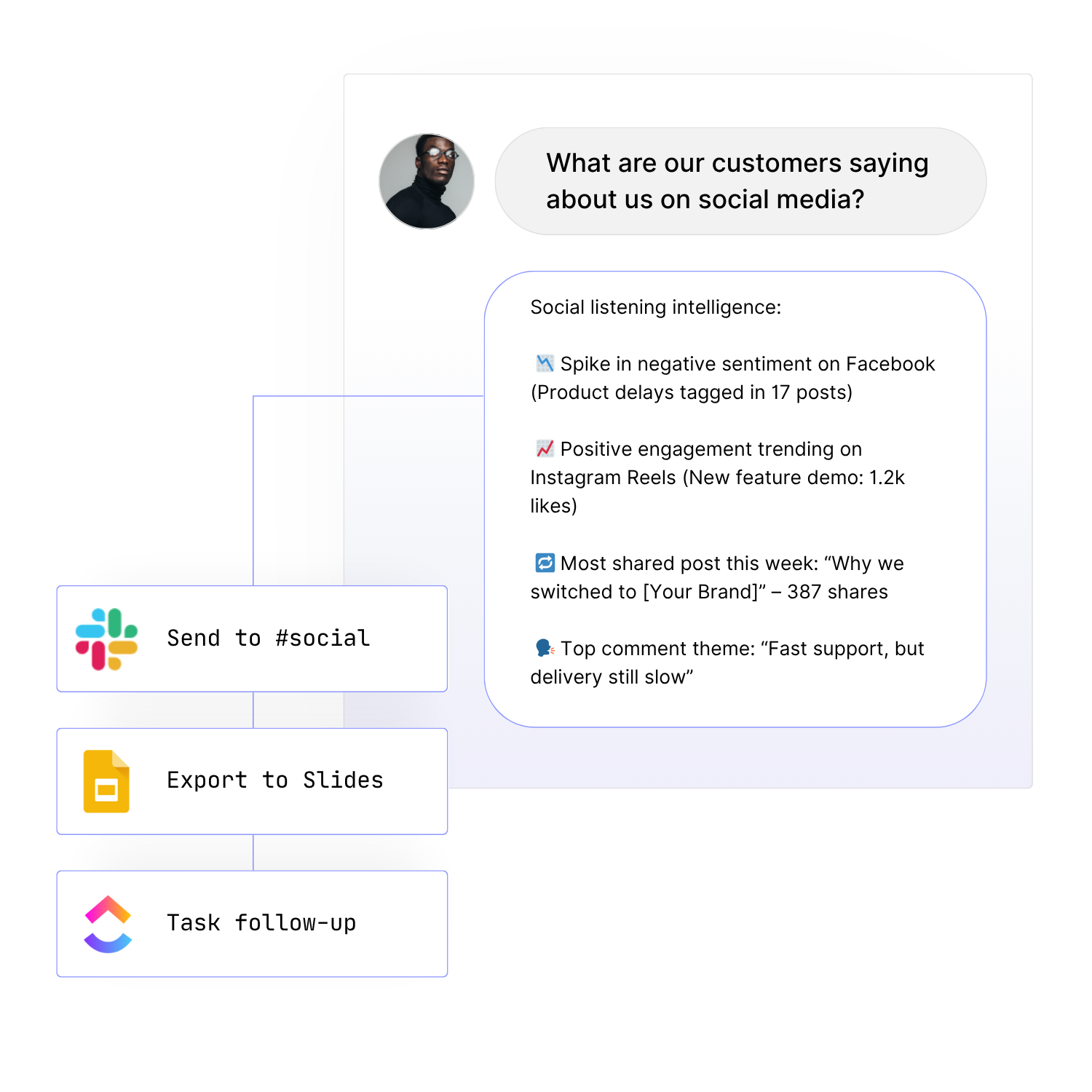
Table of Contents
- What is an AI Agent?
- How Do AI Agents Work?
- AI Agents vs Traditional Automation Tools
- Benefits of AI Agents for Businesses
- Popular Use Cases and Applications
- Challenges and Considerations
- Implementing AI Agents: Step-by-Step
- How Are AI Agents Different from LLMs like ChatGPT?
- AI Agents vs LLMs: Do You Need to Choose?
- Where Maybe* Excels
- Frequently Asked Questions
AI Agents for Business
What is an AI Agent?
AI agents are revolutionising how businesses operate. They can handle complete workflows, streamlining support, analytics and operations, so your team can focus on high-value tasks.
How Do AI Agents Work?
AI agents combine four core capabilities:
Autonomous Decision-Making
Agents pursue defined goals with minimal instruction.
Planning and Adaptation
They break down goals into actionable steps and change course as needed.
Memory and Learning
Agents remember past interactions and improve performance over time.
System Integration
They connect with apps, APIs, and data sources to complete tasks inside your organisation's existing systems.

AI Agents vs Traditional Automation Tools
Traditional tools automate tasks. AI agents automate outcomes.
| Feature | Traditional Automation | AI Agents |
|---|---|---|
| Rule Flexibility | Rigid scripts | Adaptive workflows |
| Decision-Making | None | Intelligent and autonomous |
| Context Awareness | Minimal | Persistent memory |
| Handling Ambiguity | Poor | Strong |
| System Integration | Limited or manual | Cross-platform |
| Examples | RPA bots, macros | Autonomous AI systems |
Benefits of AI Agents for Businesses
Boost productivity, reduce costs, and unlock innovation with intelligent automation.
AI Agent Use Cases by Function
Streamline every department with intelligent automation,from customer service to HR and analytics.
Customer Support
AI agents handle enquiries, triage tickets, resolve common issues, escalate complex requests, and operate 24/7.
Marketing and Sales
They qualify inbound leads, automate campaign management and content delivery. They also monitor performance and adjust in real time.
Business Operations and Analytics
Agents integrate with multiple systems to pull data, generate dashboards, and monitor performance for anomalies.
Human Resources
They support recruitment, automate onboarding, answer policy questions and coordinate staff training.
-
Automate client reporting
Monitor cross-channel campaigns
Generate proposals based on client inputs
Qualify leads across platforms
Coordinate freelancer tasks
Track sentiment across channels
-
Deliver personalised product recommendations
Adjust prices dynamically
Automate customer support at scale
Manage logistics and order tracking
-
Integrate with multiple systems and tools
Pull and analyse operational data
Generate real-time dashboards and reports
Monitor performance for anomalies and trends
-
Enable predictive maintenance scheduling
Conduct automated quality assurance
Optimise production timelines
Manage resources efficiently
-
Optimise delivery routes in real time
Track shipments automatically
Control inventory across locations
Improve supply chain visibility
-
Plan and book trips with AI assistants
Provide automated customer service via chatbots
Streamline expense reporting and reimbursements
Update live itineraries and alerts
-
Provide digital support for citizens
Accelerate processes like licensing and form submission
Improve transparency and real-time reporting
Align programs with evidence-based policies
-
Pre-qualify property leads
Schedule appointments automatically
Recommend properties based on buyer preferences
Analyse local market trends and pricing shifts
Challenges and Considerations
Build smart, safe systems. Align AI agents with business goals, technical readiness, and compliance needs.
Oversight & Goal Alignment
Set boundaries, assign clear goals, and use human approval for critical tasks during early deployments.
Training & Responsible Use
Provide AI agents with accurate data and educate employees on responsible usage.
Integration Readiness
Confirm APIs and connections are available. Legacy systems may need adaptors.
Security & Compliance
Choose platforms with encryption, audit logs, access control, and regulatory tools.
Implementing AI Agents: Step-by-Step
Start simple. Scale smart. Here’s how to roll out AI agents that actually work.
- Find the Use Case: Start with a repetitive, process-heavy task.
- Select a Platform: Opt for a secure, no-code agent platform with integrations.
- Run a Pilot: Deploy one agent and evaluate ROI.
- Train the Team: Ensure people understand how to collaborate with AI.
- Scale Carefully: Expand to other departments or workflows after success.
- Measure and Adjust: Monitor KPIs and make improvements continuously.

How Are AI Agents Different from LLMs like ChatGPT?
LLMs such as ChatGPT generate text in response to prompts. They’re excellent for content creation or answering questions, but they do not take action on their own. AI agents are autonomous systems. They plan, decide, act, and improve over time. While LLMs offer advice, agents act on it.
| Feature | LLM (e.g. ChatGPT) | AI Agent (Agentic AI) |
|---|---|---|
| State | Stateless | Stateful (remembers context) |
| Autonomy | Requires user input | Operates independently |
| Task Type | One-off commands | Full multi-step workflows |
| Decision-Making | Prompt-based | Goal-driven execution |
| System Integration | Manual | Connects to APIs & business tools |
| Complexity Handling | Low to moderate | High—can manage layered logic |
| Example | Writes an email when asked | Drafts, sends, logs email based on workflow rules |
Why This Distinction Matters
LLMs enhance productivity and creativity but require manual action at every step. AI agents deliver outcomes automatically fetching data, acting on it, and updating your systems without being prompted. They don’t just generate answers. They get business done.
AI Agents vs LLMs: Do You Need to Choose?
With Maybe*, there’s no need to choose.
| Use Case | LLM (e.g. ChatGPT) | AI Agent | Unified on Maybe* |
|---|---|---|---|
| Content creation | ✅ | ✅ | ✅ |
| Workflow automation | ❌ | ✅ | ✅ |
| Data analysis/reporting | ✅ (descriptive) | ✅ (actionable) | ✅ |
| API integrations | ❌ (copy/paste) | ✅ | ✅ |
| Data security and control | ❌ (third-party data risk) | ✅ | ✅ |
| No developer skills required | ❌ | ❌ | ✅(AI Agents deployed with natural language) |
Where Maybe* Excels
Maybe* empowers businesses to launch AI solutions in minutes, not months. With powerful no-code tools, pre-built use cases, and deep integrations across your tech stack, it's never been easier to deploy secure, enterprise-grade AI.
✔ No-Code Agent Building
✔ 100+ Pre-Built AI Agent Use Cases
✔ 2,000+ App Integrations (Slack, Notion, Click Up and more)
✔ Access to Leading LLMs (GPT-4, Claude, Gemini, Perplexity and more)
✔ AI Agents that run inside Slack and Teams
✔ Secure by Design: SOC2 Via Open AI, GDPR/EU AI Act Ready
Reporting’s faster than we thought possible and 100% on-brand.
AI Agent FAQs
What can AI Agents automate?
Tasks such as triaging support tickets, syncing databases, onboarding employees, building reports, and delivering updates anything repetitive or rules-based across teams.
How fast can I start?
With Maybe*, team members can launch AI Agents in just a few hours no code or IT department needed.
Will these replace my staff?
No. AI Agents are designed to support your team freeing them from manual tasks so they can focus on high-impact, human-first work.
Are my systems and data secure?
Yes. Maybe* uses enterprise-grade security and data encryption. We’re GDPR-compliant and follow best practices for data privacy and integrity.
Does it integrate with my tools?
Yes. Maybe* integrates with over 2,000 tools including Google Workspace, Slack, HubSpot, Salesforce, Notion, and many more.
How do I measure ROI?
Use built-in analytics to track time saved, improvements in output, cost reductions, and performance across every agent.
Can I try Maybe* for free?
Yes. Start with a 14-day free trial and launch your first AI Agent in under 30 minutes.

Get Started for Free
See how easy it is to deploy your own AI Agents. With Maybe*, get up and running in minutes no code, no risk. Automate smarter, scale faster, and do more for less.




